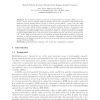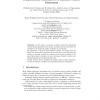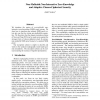199 search results - page 10 / 40 » Adaptive Proofs of Knowledge in the Random Oracle Model |
114
click to vote
PKC
2012
Springer
13 years 1 months ago
2012
Springer
Abstract. An unresolved problem in research on authenticated key exchange (AKE) is to construct a secure protocol against advanced attacks such as key compromise impersonation and ...
PROVSEC
2009
Springer
15 years 3 months ago
2009
Springer
Abstract. Oracle separation methods are used in cryptography to rule out blackbox reductions between cryptographic primitives. It is sufficient to find an oracle relative to whic...
SACRYPT
1998
Springer
15 years 3 months ago
1998
Springer
In this paper, we present a simple method for generating random-based signatures when random number generators are either unavailable or of suspected quality (malicious or accident...
80
Voted
CRYPTO
2005
Springer
15 years 4 months ago
2005
Springer
The Full-Domain Hash (FDH) signature scheme [3] forms one the most basic usages of random oracles. It works with a family F of trapdoor permutations (TDP), where the signature of m...
120
click to vote
FOCS
1999
IEEE
15 years 3 months ago
1999
IEEE
We introduce the notion of non-malleable noninteractive zero-knowledge (NIZK) proof systems. We show how to transform any ordinary NIZK proof system into one that has strong non-m...



